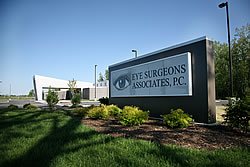Michael Boehm, MD
While modern medicine offers us tremendous options to treat and cure a wide range of eye conditions, there is a growing trend to increase the role of vitamins and nutritional support in the management of eye disease. Many areas in medicine have clear indications that vitamin or nutritional supplement use can help with the prevention or control of disease. However, what are the role of vitamins and nutritional supplements in the care and management of specific eye diseases?
The most significant role of vitamins in the management of eye disease has been proven in regards to macular degeneration. Macular degeneration, or AMD, is a leading cause of vision loss due to age-related changes in the retina. An overwhelming avalanche of nutritional or vitamin supplements have gained widespread popularity in the “treatment” of AMD. However, most of these approaches are not backed by clear-cut scientific proof.
Only one large and exhaustive scientific collection of studies (the Age-Related Eye Disease Study, or AREDS and AREDS 2) published by the National Eye Institute, showed that the daily use of a specific high-dose multivitamin (AREDS or AREDS 2 formula) reduced the risk of developing advanced AMD by about 25 percent – but only for those patients who already had intermediate or advanced disease. The outcomes of this study have often been extrapolated to apply to everyone, as if taking a vitamin will “cure” or prevent AMD. Science simply does not back this generalization, although studies are ongoing to examine the impact of the use of certain supplements alone on patients without disease, but with certain risk factors such as a strong family history of AMD.
Current research also does not support any assumption that certain supplements or vitamins such as anti-oxidants play a role in preventing or treating cataracts, glaucoma, or diabetic eye disease. Essential fatty acids such as Omega-3 have received plenty of attention for various eye conditions, and there is a collection of evidence that supplements such as omega 3, fish oil, or flaxseed oil can be part of a regimen in treating dry eye disease.
Ultimately, the vitamins or supplements you choose to use should be done after discussion with your primary care provider or ophthalmologist. Vitamins are not harmless, as there are well-known side effects or even toxicity risks from “too much of a good thing.” The true best source of proper vitamins, minerals, or anti-oxidants should really come from your diet. Whole grains, fruits, vegetables, fish, and low fat consumption in our daily diet are the best source for these components as part of a well- balanced diet. After all, our mothers really did know best when they told us to “eat your vegetables.” Your eyes will thank you in the long run!
Michael Boehm, M.D. is a board certified comprehensive ophthalmologist at Eye Surgeons Associates with a fellowship in cornea and external diseases and a specialty interest in dry eye. Dr. Boehm practices at our offices in Bettendorf, Silvis and Rock Island. For more information visit www.esaeyecare.com.
The material contained in this article is for informational purposes only and is not intended to be a substitute for professional medical advice, diagnosis, or treatment. Always seek the advice of your physician or other qualified health care provider.




